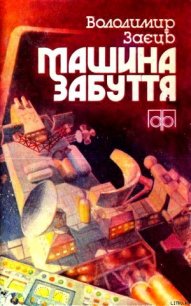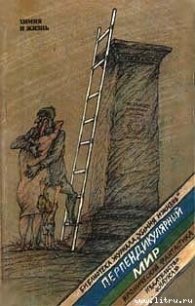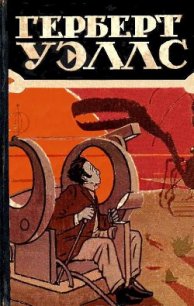Машина ужаса (Фантастические произведения) - Орловский Владимир (лучшие книги читать онлайн бесплатно txt) 📗
“Well, well, Signor Deriugin, I am happy to congratulate you!” said the chief engineer, after he was bandaged. “You certainly had a lucky escape. Had you not torn the pistol from the fiend’s hand with the aid of the electro-magnet, we would not have had the pleasure of speaking to you now.”
Indeed, the current turned into the field coils had transformed it into a powerful magnet, which attracted Flinder’s pistol.
“Everything is well — that ends well!” replied Deriugin smilingly. “But it is too bad, for the accident will retard my work for a few days.”
A CROSS-EXAMINATION of Eitel proved beyond conjecture that they were dealing with a mentally-deranged person. He was one of those innumerable victims of the turbulent quarter of this century, whose fatigued and strained mind could not resist the powerful attacks of these frightful days. To turn him over to the authorities was not considered a wise move, as the streets nowadays were overfilled with similar madmen. Besides, the city itself resembled a huge Bedlam. It was decided to detain him on the factory grounds under special guard, in one of the rooms of the resident body of engineers.
However, in the pellmell of new events, he was completely forgotten. At the end of the week a dispatch came that the fiery vortex had again appeared on the French coast and it was coursing along the southwestern boundary toward the Mediterranean Sea. Three electromagnets from the Creusot Works were sent out by railroad to intercept it, but they arrived too late. Destroying Toulouse and converting the Haute-Garonne into a veritable desert, the fiery vortex again wended its course over the maritime expanse. Now, within about forty-eight hours, it was expected somewhere on the western coast of Italy. Five new engines, fully equipped, were mounted on platforms in Genoa and shipped to Rome, whence it was easy to move them to any point on the coast. Locomotives stood in readiness, day and night, awaiting orders to fling their loads into action.
Deriugin, the chief engineer, and a number of mechanics were all ready at any moment to meet the treacherous foe.
However, after reading through the details about the movements of the atomic flame, the young engineer suddenly began to doubt the expediency of his own project. The cursed sphere continued to grow ever larger and larger, making the approach to it difficult and dangerous. An entirely new question now arose. Would it be possible to get near enough the sphere — within the proximity of about 70 or 100 feet, for instance, without being exposed to the danger of being scorched in its sultry atmosphere? Would the electromagnets be effective at such a distance? And, if so, suppose they succeeded in encircling and arresting it? What then? Wasn’t it too' late?…
Deriugin, however, did not share his views with his comrades, but continued to work as obstinately as before. But this was not all; there was still another discouraging feature of this affair. Alarming dispatches were arriving from Naples; Vesuvius was speaking in a manner never heard before. Tremendous pillars of vapor, 12 to 18 miles high, were rising from the crater. The Earth was sighing and rumbling as on the day of the Last Judgment. Naples was already destroyed and the inhabitants were fleeing from under the ruins in wild terror.
All this was sufficiently awe-inspiring in itself, without adding to the already difficult struggle with the atomic vortex. All the railroads were crammed with train-loads of refugees from the South. The panic, doubled by the new catastrophe, completely disorganized the authorities. Besides, even here, about two hundred kilometers away from the volcano, light tremors of the Earth were beginning to be felt. And most of all, a noticeable wind was beginning to draw. The chief engineer was grumbling and scowling, it seemed, as if he too were beginning to wonder whether the struggle was worth the pains.
On Tuesday evening, June 1, the radio announced that the vortex had passed between Corsica and Sardinia, taking an eastward course; at the same time another engine had arrived in Rome from Genoa and five from Le Creusot, France, to assist in the work. This was considered sufficient power to cope with the situation. The whole division of engines moved further south, every necessary step was taken to facilitate the unloading, when the hour of battle arrived, or to trail the fiery enemy, if a chance presented itself. A chain of observation posts were stationed all along the coast; on belfries, churches and field watch- towers. Everyone’s nerves were strained to the extreme by feverish expectations. Meanwhile, from the south-east, the din of the volcano was clearly audible and a fiery pillar, like a giant torch, stood high in the darkening sky. Deriugin was filled with apprehension, as he anticipated the new, impending storm and shook his head sadly when he realized suddenly that the wind had begun to play stronger and sharper.
At two in the morning, the flaming cloud appeared alongside the shore. The engines were immediately started eastward toward the sea. At three o’clock, in two lines of a semi-circle one kilometer in diameter, they rolled down to the sea at the very moment when the flaming sphere, in curling vapor, whistling, hissing, with rolling thunder, reached the contingent almost in the center of the arc formed by the iron giants.
Deriugin was in one of the electro-magnets; he sat in a small cabin together with the commander and mechanic in the curve of the left line. It was dawning and in a few minutes the whole panorama was as clear as daylight. On the right and on the left puffed and roared the metallic parts of the massive monsters, resembling huge crabs. On the upper platforms gleamed flashes of light — optic signals, transmitting orders from the chief engineer, whose engine was outside the arc of the second line. Directly in front the fiery, fuming Sphere, freed from the vaporous atmosphere, darted lightning, emitted sparks, roared and thundered and breathed forth its heat and blinding light. Here, at a distance of a half a kilometer, the intensity of the heat was being felt. Everywhere, on the engines, over the bushes and trees along the shore, untouched as yet, jumped and quivered lights, like drops of cold water. At the same time, from the south-east ever louder roared the distant mountain and a huge black-gray pillar standing in the air, tossed its smoky peak up high on the crest of the wind.
The strange chase began.
The center of the arc remained stationary while its ends gradually were bending in, encircling the sphere from all sides and from the rear. The electro-magnets were put into action, but, at such a distance their influence, apparently, was insufficient. The fiery vortex moved eastward into the depth of the continent and the engines were retreating at the same speed. Retreating thus about six miles amid thundering, booming, crackling and dinning from all sides, the chief engineer decided to start the offensive. The center of the front tractors halted, the others closed on to the center from all sides, locking the ring tighter. The fiery sphere was approaching. The engines shuddered, sighed, and bellowed, as if alive. The dazzling light cut the eyes and the air was stifled with heat, as if hell itself had burst open. It was becoming more and more difficult to breathe; the blood rushed up the temples; the body reeked with perspiration, ached and grieved.
The cloud continued its approach.
Was it possible that all the efforts would be reduced to naught— turned into child’s play? Was it possible that the attempts were made with inadequate means and that the vortex would fly past over their corpses on to the Apennines? The fiery cloud was so near that the eyes were about to burst with heat; the head was spinning; there was no air in the chest. Deriugin unwillingly shut his eyes; he was about to faint. Suddenly someone grasped his arm. He opened his eyes. The chief mechanic, his face disfigured and his eyes bulging out, pressed his fingers painfully against Deriugin’s, shouting madly, trying to overcome the furious din of the engines:




